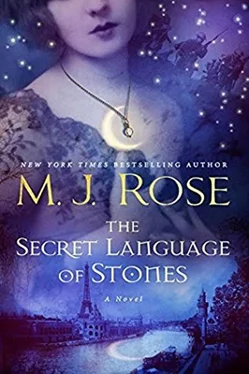“Watching my child in pain and not being able to take it away was excruciating. Worrying he died in pain has been agonizing. I can bear my own suffering. But his? Knowing I could not make it better, could not take it away? Torture.”
I let go of her hands, and she let go of the talisman. It fell against her white smock.
“Thank you,” she said. “I didn’t believe you would really be able to channel him… but I was wrong. I’m sorry.”
I shook my head. “Don’t apologize. I’m just glad if it helps, even a little.”
“It will.”
Eager to leave, I stood. My heart raced. I was perspiring. I didn’t understand what had happened and didn’t wish to think about it while there.
Madame Alouette escorted me to the door. I extended my hand to shake hers, but she grabbed me by the shoulders and held me to her. At first I recoiled, in fear she’d feel the talisman hanging around my neck, hidden under my dress. Then I realized that, even if she did, she wouldn’t question it. There was nothing suspicious about me wearing one of my own pieces. As she held me, I experienced a sudden longing to talk to her about Jean Luc. About the sound of his voice. How special he seemed. About how he was the only soldier who had ever spoken directly to me, not just through me. I wanted to know what he looked like and how he dressed and what pleased him and what didn’t.
But I couldn’t, of course. She had what she wanted. Even though I hadn’t used Jean Luc’s hair in the talisman I made for his mother, he’d sent her the message she needed to hear. And as I crossed the courtyard, peopled with cold marble statues, I wondered how any of it was possible. How indeed?
The next day, I put down my tools as soon as the shop’s ornate silver clock struck noon and the lyrical bells rang out the hour. “I’m going out,” I announced to Monsieur Orloff, who looked up from his enamel work.
“I have an errand on rue Drouot. Is there anything you need me to pick up on the way back?”
“The newspaper office?” he asked.
I nodded.
“Why are you going there, Opaline?”
It sounded like a simple question, but he would never take a simple answer. Monsieur examined, thought, angled, delved. He reminded me of my friend Lucille’s father. When I was younger, I was jealous at how he inquired about her every move, thinking he must love her more than my father or mother loved me for they gave me so much freedom and questioned me so little.
“I want to see some back copies of Le Figaro .”
Of course the answer didn’t satisfy him.
“Which back copies?”
I took my hat off the rack and put it on, adjusting it in the mirror.
“One of our clients told me her son was a columnist who used to write for the paper, and to please her I thought I should read some of his work.”
He liked my answer-anything to ensure a sale.
“You might keep your ears open in case anyone is talking about the royals.”
In the Orloff home, as in every Russian émigré’s home, endless hours were spent pondering the fate of Tsarina Alexandra and her five children. No news at all had emerged from Russia since the announcement of the tsar’s assassination, and everyone was tense and anxious.
“I will.”
“And don’t talk to anyone about anything we discuss here. Remember, there are spies everywhere.”
At least several times a week, Monsieur Orloff had warned me and Grigori and Anna there could be Bolsheviks lurking around any corner.
“Why would they be watching you, Monsieur? You’re a jeweler who has been in Paris for over ten years. What would Bolsheviks want with you?” I’d asked the same questions before, but was never given a satisfying answer.
That day was no different.
“Anyone close to the royal family is suspect, Opaline. All sympathizers are threats, I’ve told you that. Don’t forget, don’t say anything about the shop, about our inventory, about the vaults. Not a word about our business to anyone.”
The same warning. As annoying as it was, it also made me sympathize with the stern man who was teaching me to become an artist. How frightening to watch your country thrown into a revolt and your way of life despised by your fellow countrymen. Even though the Orloffs had already been in Paris during the revolution, the émigrés who’d arrived in the last year, the community they all formed, were a constant reminder of what was now and what was no more.
I opened my umbrella as soon as I stepped out of the shop. The morning’s light drizzle was becoming a heavy rain. The dreary weather exacerbated the malaise hanging over the city. Every day was bad, but that day was worse. Morning news reported the threat of more bombs, and the air hummed with anxiety. Parisians tried to remember before the war, and the wonders of that past grew in our minds. We yearned to take off the mantle of mourning. We wanted our beautiful women to dress up again, to wear too much perfume, throw parties that were too lavish, that went on too late. We wanted the food restrictions lifted and to gorge on gastronomical delights. Our city no longer shone, never glittered. It was drowning. In so much rain. In so much sadness.
I reached the newspaper’s office in fifteen minutes. A receptionist asked how she could help me and, after I explained, directed me to a second-floor office. The nameplate on the door identified the occupant as Marie Lund.
I stepped inside, introduced myself, and asked if I could buy some Le Figaro back copies.
“Can you tell me the dates?”
“I’m not sure actually.”
She was young, probably about my age. Another woman in a job that had belonged to a man four years prior. There were so few men of a certain age left in Paris, and many were either too infirm to begin with or were soldiers who’d come home. Men like Madame Alouette’s clients or Grigori, somehow damaged.
“We’ve published a paper every day for over ninety-two years.” She smiled. “You’ll need some dates.”
“I wanted to read Jean Luc Forêt’s columns.”
Mademoiselle Lund gave me a knowing smile, which I didn’t understand. And then, her face fell as she remembered what she’d forgotten for a moment. “It’s so sad, isn’t it?” she said, assuming I knew his fate. And since I did, I nodded.
“Women have been writing us condolences since we announced his death. Hundreds of letters arrived. It’s as if they knew him.”
“Does every columnist for the paper engender such admiration?”
“Admiration? It’s not admiration. Half the women in Paris were in love with him.”
When I didn’t say anything, she cocked her head and gave me an appraising once-over.
“Have you ever read any of the columns?”
“Not the Ma chère columns, no. I met his mother recently and she told me about him… She made me curious.”
“Ah, I see. Well, he’s been writing this column since he went off to war. It’s called Ma chère because each column is written like a letter home to his lover, you see. He never uses her name, and so we can all imagine we’re her. And we all want to be her because we all want him to be in love with us. Oh dear, I can’t get used to the idea he’s gone. We published his last column just three weeks ago, with a note from the editor at the end.”
“Did you know him?”
“I met him twice,” Mademoiselle Lund said. “When he came home on leave, he would come to the offices.”
“What did he-” I stopped myself. I didn’t want to hear this woman’s description of him. I wanted to keep my own impression of him intact without anyone sullying it. Jean Luc was a glimmer in the darkness, a deep voice with a musical undertone like a cello playing a solo on an otherwise empty stage.
Читать дальше












